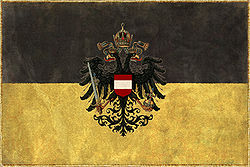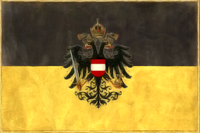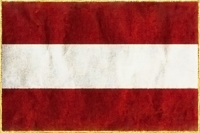Difference between revisions of "Austria (ETW Faction)"
m (I goofed.) |
m |
||
| (2 intermediate revisions by 2 users not shown) | |||
| Line 4: | Line 4: | ||
==Overview== | ==Overview== | ||
| − | + | [[File:Austria_FlagETW.png|200px|Monarchy]] [[File:AustriaAlternate_FlagETW.png|200px|Republic]] | |
| − | [[ | ||
The history of Austria is one of warfare against invaders from the east, and the infidel Turks in particular. Originally, the Duchy was the eastern marches of the Holy Roman Empire (the Ostmark), and the defensive importance of Austria to the rest of Europe is immense. For nearly 250 years, the Ottoman Turks have hurled themselves against the bastion of Austria, reaching the gates of Vienna on more than one occasion. The last time was in 1683. Austrian bravery has kept them at bay, every time. | The history of Austria is one of warfare against invaders from the east, and the infidel Turks in particular. Originally, the Duchy was the eastern marches of the Holy Roman Empire (the Ostmark), and the defensive importance of Austria to the rest of Europe is immense. For nearly 250 years, the Ottoman Turks have hurled themselves against the bastion of Austria, reaching the gates of Vienna on more than one occasion. The last time was in 1683. Austrian bravery has kept them at bay, every time. | ||
| Line 198: | Line 197: | ||
| − | |||
{{ETW Factions}} | {{ETW Factions}} | ||
| + | |||
| + | [[Category:ETW Factions]] | ||
Latest revision as of 12:41, 13 July 2020
| Austria (ETW Faction) | |
|---|---|
 | |
| Name: | Austria |
| From Game: | Empire: Total War |
| Religion: | |
| Culture: | European |
| Playable: | |
Austria is one of the 11 playable nations in Empire: Total War's Grand Campaign. It is also a major faction in the game.
Overview
The history of Austria is one of warfare against invaders from the east, and the infidel Turks in particular. Originally, the Duchy was the eastern marches of the Holy Roman Empire (the Ostmark), and the defensive importance of Austria to the rest of Europe is immense. For nearly 250 years, the Ottoman Turks have hurled themselves against the bastion of Austria, reaching the gates of Vienna on more than one occasion. The last time was in 1683. Austrian bravery has kept them at bay, every time.
After the bloodletting of the last century – the Thirty Years War – within the Holy Roman Empire, Austria is a leading power among “the Germanies”. Leopold I, the ruling Hapsburg, has brought peace and prosperity, and maintained a first-class military machine (in particular, the Austrians have mastered the tactics of using light, irregular troops). This gives the Austrians the potential to become a truly great power, either within the borders of the old Empire, to the south in Italy, or to the east. This latter scheme requires the Turks to be persuaded – at sword point – that their destiny lies outside Europe. The Austrians also have much to be proud of in the arts, music and culture.
Beyond their immediate borders, there are other matters for the Hapsburgs to consider. The Spanish branch of the family is now close to extinction, as Charles II has failed to produce an heir, among his other problems. Perhaps Spain should remain a part of Hapsburg domains, but this might lead to confrontation with France. And then, of course, there are the pan-Slavic, Christian Orthodox ambitions of the Russian Tsar to consider…
Unit Details
Austrian line infantry have 25% more manpower. For example, on ultra settings an Austrian line infantry regiment has 200 men instead of the usual 160. This bonus only applies to European line infantry; no other line infantry type (including colonial line infantry) receives this increased manpower. Austrian line infantry suffers from very poor quality, but make up for this by being better able to surround enemies due to their larger numbers. In the Elite Units of the West DLC, Austria's poor line infantry are balanced by its excellent Hungarian Grenadiers.
Austria has access to a diverse range of excellent cavalry. Uniquely for a major faction, Austria can train Hungarian Hussars (although only from Hungary), which are superior to regular hussars. Uhlans, Light Dragoons, Household Cavalry and Carabineers are also available.
Austria fields unique and exceptional light infantry: Jaegers, which have the same requirements as generic light infantry but with superior statistics; Grenzers, which have double the firepower of a light infantry regiment thanks to their double-barreled muskets; and Windbusche Jaegers, some of the finest elite light infantry in the game despite their inferior numbers. However, in recruiting these units Austria suffers from geographical limitations, as jaegers are only available in Europe, and Windbusche Jaegers in Austria (along with a two regiment limit). Unfortunately, the game is glitched and Grenzers cannot be trained in the Grand Campaign without modding. Grenzers are, however, freely available in multiplayer and battles.
Therefore, Austria should attempt to keep its battles and enemies within Europe, to take advantage of its numerically superior line infantry and its unique and diverse light infantry.
Starting Position
Austria begins the game with a total of 6 regions. The whole Austrian Empire is located in the European theater as the country doesn't have any colonies. While Austria's province Croatia does border the Mediterranean Sea, the rest of the country has no access to the sea. Therefore, Austria is a very land based nation which is reflected by its strong army yet weak navy. Austria's capital is Vienna which is also its most developed city. However, Hungary is the most populous region, followed by Bohemia & Moravia. Austria's lands are fairly prosperous and should be able to support a decent army even in the early game.
The Austrian Empire borders Bavaria in the west, Saxony, Prussia and Poland & Lithuania in the north and the Ottoman Empire in the southeast. The country does not start at war with anyone and is allied to Bavaria.
Austria is unusual for having spread-out and specific unit training centers. While Vienna will eventually be able to field Guards and Household Cavalry, the Austrians heavily rely on Hungary to produce its special troops and horse regiments: Hungarian Hussars, Hungarian Grenadiers, and Grenzers. Therefore, Austria must hold on to Hungary if it wishes to benefit from its full unit roster.
Austria may do well to renew the war with the weakened Ottoman Turks, giving an opportunity to easily expand their empire and resources. However, venturing too far into the Ottoman Empire will limit Austria's capability to train its numerically superior European Line Infantry and its excellent light infantry. On the other hand, fighting in Europe would be more challenging, but also allow Austria to retain its army strengths.
Austria's chief worries lie in the north. The rising power of Prussia may look insignificant, but fields some of the best units in the game, while Poland-Lithuania is large, wealthy, and has loyal allies. Both will almost definitely declare war on Austria, usually within the first few turns. While Austria has some allies, they more often than not choose to abandon Austria rather than go to war. Austria's German allies will need protecting from the Prussians and possibly the French, while Spain has a historical dislike for Austria.
Victory Conditions
Short Campaign
Capture and hold 15 regions by the end of the year 1750, including: Austria, West Prussia, East Prussia, Hungary, Rumelia, Brandenburg, and Venetia.
Long Campaign
Capture and hold 30 regions by the end of the year 1799, including: Austria, West Prussia, East Prussia, Hungary, Rumelia, Brandenburg, Venetia, and Poland.
World Domination
Capture and hold 40 regions by the end of the year 1799, including: Austria.
Basics at start
- Protectorates – None
- Allies – Wurttemberg, Bavaria, United Provinces, Westphalia, Savoy, Great Britain
- Trade Partners – Italian States, Bavaria, Venice
- Enemies – Barbary States, Pirates
- Religion – Catholic
- Government – Absolute Monarchy
- Ruler – Leopold I (King)
- Population – 13,306,428
- Prosperity – Moderate
- Prestige – Respected
- Treasury – 8500
- Technology - None
- Missionaries – Abraham a Sancta Clara (Hungary)
- Rakes – Georg Brankovic (Serbia)
- Gentlemen – Johannes Despotovic (Austria)
Europe Theatre
Vienna, Austria
- Starting Buildings – Barracks, Royal Palace, Conservatorium, Cannon Foundry, Settlement Fortifications
- Infrastructure - Basic Roads
- Population – 2,390,663
- Wealth – 4300
- Religion – Catholicism 100.0%
- Starting Towns/Ports – Tyrol Mines (Iron Mine), Voralberg Farmland (Peasant Farms), Danube Farmland (Peasant Farms), Rauris Mines (Gold Mine), Salzburg (Craft Workshops Weavers), Graz (School), Triest (Trading Port), Innsbruck (Church School)
- Later Villages/Ports – None
Prague, Bohemia & Moravia
- Starting Buildings – Army Encampment, Governor’s Residence, Conservatorium
- Infrastructure - Basic Roads
- Population – 3,147,771
- Wealth – 1750
- Religion – Catholicism 40.0%, Protestantism 60.0%
- Starting Towns/Ports – Pilsen Farmland (Peasant Farms), Ostrau Mines (Iron Mine), Olmutz (Coaching Inn)
- Later Villages/Ports – Budweis (Village)
Breslau, Silesia
- Starting Buildings – Governor’s Mansion
- Infrastructure – Basic Roads
- Population – 1,531,752
- Wealth – 1300
- Religion – Catholicism 40.0%, Protestantism 60.0%
- Starting Towns/Ports – Odor Farmland (Peasant Farms), Gleiwitz (Craft Workshops Smiths)
- Later Villages/Ports – Glogau (Village)
Pressburg, Hungary
- Starting Building – Military Governor’s Encampment, Settlement Fortifications
- Infrastructure – Basic Roads
- Population – 4,051,868
- Wealth – 450
- Religion – Catholicism 80.0%, Protestantism 20.0%
- Starting Towns/Ports – Balaton Farmland (Peasant Farms), Csongrad Farmland (Not Developed)
- Later Villages/Ports – Banska Stiavnica (Village), Buda & Pest (Village), Szeged (Village), Nyiregyhaza (Village)
Klausenburg, Transylvania
- Starting Building – Military Governor’s Encampment
- Infrastructure – Basic Roads
- Population – 1,430,912
- Wealth – 1325
- Religion – Catholicism 0.0%, Protestantism 5.0%, Orthodox 95.0%
- Starting Towns/Ports – Hunedoara Farmland (Peasant Farms), Brasov Mines (Iron Mine)
- Later Villages/Ports – Szatmarnemeti (Village), Gyuláchféhervar (Village)
Zagreb, Croatia
- Starting Buildings – Governor’s Residence
- Infrastructure – Basic Roads
- Population – 753,462
- Wealth – 975
- Religion – Catholicism 100.0%
- Starting Towns/Ports – Karlovac Farmland (Peasant Farms), Split (Craft Workshops Weavers), Vodice Vines (Vineyard)
- Later Villages/Ports – Osijek (Village), Rijeka (Port), Zadar (Port)
Units
Artillery
- Sakers
- Demi-Cannons
- 4-inch Mortar Battery
- Rocket Troop
- 12-lber Foot Artillery
- 3-lber Horse Artillery
- 12-lber Howitzer Foot Artillery
- Puckle Guns
- 24-lber Foot Artillery
- 6-lber Horse Artillery
- 24-lber Howitzer Foot Artillery
Infantry
- Company Infantry
- Line Infantry
- Colonial Line Infantry
- Militia
- Colonial Militia
- Conscripts
- Pikemen
- Jaegers
- Grenadiers
- Hungarian Grenadiers
- Guards
- Republican Guard
- Grenzers
- Windbusche Jaegers
- Pandours
- Colonial Light Infantry
- African Native Infantry
- Sepoys
- Ghoorkas
- Native Musketmen Auxiliary
- Native Warrior Auxiliary
- Native Bowmen Auxiliary
- Dahomey Amazons
Cavalry
- General's Bodyguard
- Provincial Cavalry
- Carabineers
- Hungarian Hussars
- Light Dragoons
- Colonial Dragoons
- Uhlans
- Cuirassiers
- Household Cavalry
- Company Cavalry
- Colonial Light Cavalry
- Mounted Tribal Auxiliary
- Brig
- Sloop
- Razee
- Sixth Rate
- Fifth Rate
- Admiral's Flagship, 5th Rate
- Fourth Rate Ship of the Line
- Third Rate Ship of the Line
- Admiral's Flagship, 3rd Rate
- Second Rate Ship of the Line
- First Rate Ship of the Line
- Heavy First Rate
- Admiral's Flagship, 1st Rate
- Carronade Frigate
- Steamship
- Galley
- Light Galley
- Indiaman
- Bomb Ketch
- Rocket Ship

